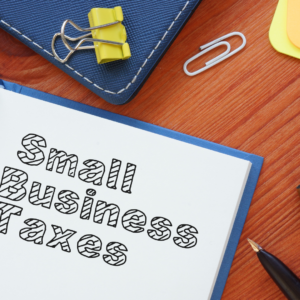As a small business owner, you are always looking for ways to minimize your taxes. After all, the less tax you have to pay, the more money you can keep in your pocket. But with so many different tax laws and regulations out there, it can be difficult to know where to start. Luckily, we have put together the ultimate guide to help you minimize your taxes as a small business owner.
Filing small business taxes for the first time

Filing small business taxes for the first time can be intimidating, but it doesn’t have to be. There are a few key things to keep in mind that will make the process much smoother. First, you need to choose the right business structure. This will determine which forms you need to file. Next, you need to gather all of your financial documentation, including income and expenses. Finally, you need to calculate your tax liability and file your return by the deadline.
Top small business tax deductions
As a small business owner, it’s important to be aware of the many tax deductions that are available to you. By taking advantage of these deductions, you can save a significant amount of money on your taxes. Here are 12 small business tax deductions that you may be eligible for:
- Business use of your home: If you use a portion of your home for business purposes, you may be able to deduct a portion of your mortgage or rent, as well as utility costs and other expenses.
- Business travel expenses: Travel expenses related to your business, such as airfare, hotels, and rental cars, are generally tax-deductible.
- Equipment and supplies: You can deduct the cost of equipment and supplies used for your business, such as computers, office furniture, and inventory.
- Advertising and marketing costs: The costs of advertising and marketing your business, such as brochures, website design, and online advertising, are generally tax-deductible.
- Professional dues and memberships: Dues paid to professional organizations and memberships in trade associations are typically tax-deductible.
- Car expenses: If you use your personal car for business purposes, you may be able to deduct a portion of the costs, such as gas and maintenance.
- office supplies and equipment: If you use your personal office supplies and equipment for business purposes, you may be able to deduct a portion of the costs.
- travel expenses: If you travel for business purposes, you may be able to deduct a portion of the travel expenses.
- educational expenses: If you incur educational expenses related to your business, you may be able to deduct a portion of the costs.
- legal and accounting fees: If you incur legal or accounting fees related to your business, you may be able to deduct a portion of the costs.
- meal entertainment: If you entertain clients or customers for business purposes, you may be able to deduct a portion of the costs.
- interest and banking fees: Interest and banking fees related to your business are generally tax-deductible.
These are just a few of the many small business tax deductions that may be available to you. Be sure to speak with your accountant or tax advisor to determine which deductions you qualify for. By taking advantage of these deductions, you can save a significant amount of money on your taxes.
What you need to know about the small business taxes.

Depending on the type of business you operate, your tax rate will be different. For example, a sole proprietorship is taxed differently than a corporation. Furthermore, the tax rate also varies depending on the amount of income your business earns. The small business tax rate is generally lower than the corporate tax rate. This is because the government recognizes that small businesses have less revenue and therefore can’t afford to pay as much in taxes. However, it’s important to remember that even though the small business tax rate is lower, you still have to pay taxes on your profits. That’s why it’s important to keep track of your expenses and make sure you’re saving money so you can afford to pay your taxes.
How to reduce your small business taxes
As a small business owner, it’s important to understand the different types of taxes you may be liable for. The most common type of business tax is an income tax, which is levied on the profits of your business. You may also be liable for other types of taxes, such as property taxes, sales taxes, and payroll taxes. Familiarizing yourself with the different types of deductions and credits available can help you reduce your tax bill.
There are a number of deductions available for small businesses, including deductions for business expenses, startup costs, and home office expenses.
 There are also a number of tax breaks and incentives available to small businesses, such as the Small Business Health Care Tax Credit and the Research and Development Tax Credit.
There are also a number of tax breaks and incentives available to small businesses, such as the Small Business Health Care Tax Credit and the Research and Development Tax Credit.
Keeping track of all expenses throughout the year can help you maximize your deductions come tax time.
Finally, if you expect to owe more than $1,000 in taxes, making estimated tax payments can help you avoid penalties and interest charges.
Hiring an accountant or using tax software can also help you file your return accurately and on time.

Take Action:
As a small business owner, you want to keep as much of your hard-earned money as possible. While there’s no way to get around paying taxes altogether, there are ways to minimize how much you have to pay each year. Here at The Profit House by DH Financial, we want to help you do just that. We offer consultations where we can go over your specific situation and provide actionable advice on how you can reduce your tax bill and increase your profits. So if you’re looking for some assistance in this area, please give us a call or book an appointment online today https://calendly.com/dhfinancial/the-profit-house-complimentary-consultation .
We would be more than happy to help!
Resources:
https://www.merchantmaverick.com/first-time-filing-small-business-taxes/
https://www.keyword-suggest-tool.com/search/how+can+i+get+an+llc/
https://www.irs.gov/help/ita/which-form-should-i-use-to-file-my-taxes
https://www.merriam-webster.com/dictionary/tax-deductible
https://www.fundera.com/resources/small-business-revenue-statistics
https://startupsavant.com/small-business-taxes/

